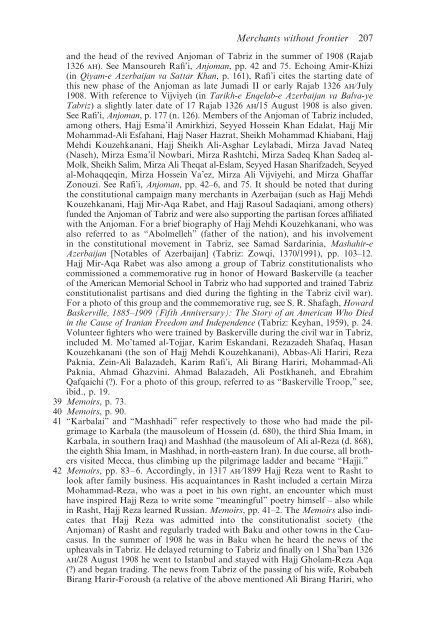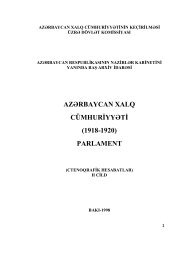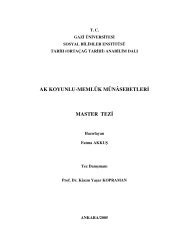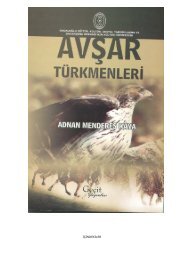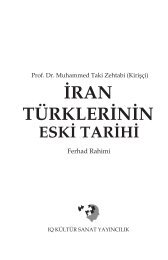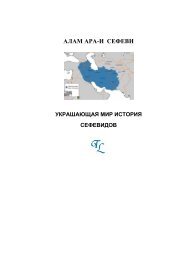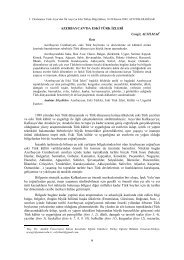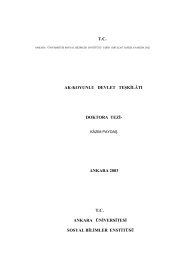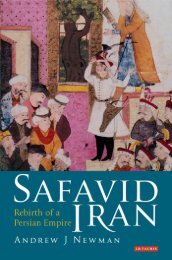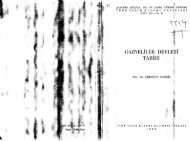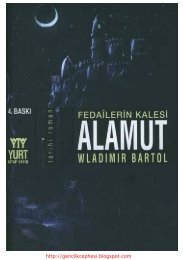Merchants without frontier 207<strong>and</strong> the head of the revived Anjoman of Tabriz <strong>in</strong> the summer of 1908 (Rajab1326 ah). See Mansoureh Rafi’i, Anjoman, pp. 42 <strong>and</strong> 75. Echo<strong>in</strong>g Amir-Khizi(<strong>in</strong> Qiyam-e Azerbaijan va Sattar Khan, p. 161), Rafi’i cites the start<strong>in</strong>g date ofthis new phase of the Anjoman as late Jumadi II or early Rajab 1326 ah⁄July1908. With reference to Vijviyeh (<strong>in</strong> Tarikh-e Enqelab-e Azerbaijan va Balva-yeTabriz) a slightly later date of 17 Rajab 1326 ah/15 August 1908 is also given.See Rafi’i, Anjoman, p. 177 (n. 126). Members of the Anjoman of Tabriz <strong>in</strong>cluded,among others, Hajj Esma’il Amirkhizi, Seyyed Hosse<strong>in</strong> Khan Edalat, Hajj MirMohammad-Ali Esfahani, Hajj Naser H<strong>az</strong>rat, Sheikh Mohammad Khiabani, HajjMehdi Kouzehkanani, Hajj Sheikh Ali-Asghar Leylabadi, Mirza Javad Nateq(Naseh), Mirza Esma’il Nowbari, Mirza Rashtchi, Mirza Sadeq Khan Sadeq al-Molk, Sheikh Salim, Mirza Ali Theqat al-Eslam, Seyyed Hasan Sharifzadeh, Seyyedal-Mohaqqeq<strong>in</strong>, Mirza Hosse<strong>in</strong> Va’ez, Mirza Ali Vijviyehi, <strong>and</strong> Mirza GhaffarZonouzi. See Rafi’i, Anjoman, pp. 42–6, <strong>and</strong> 75. It should be noted that dur<strong>in</strong>gthe constitutional campaign many merchants <strong>in</strong> Azerbaijan (such as Hajj MehdiKouzehkanani, Hajj Mir-Aqa Rabet, <strong>and</strong> Hajj Rasoul Sadaqiani, among others)funded the Anjoman of Tabriz <strong>and</strong> were also support<strong>in</strong>g the partisan forces affiliatedwith the Anjoman. For a brief biography of Hajj Mehdi Kouzehkanani, who wasalso referred to as “Abolmelleh” (father of the nation), <strong>and</strong> his <strong>in</strong>volvement<strong>in</strong> the constitutional movement <strong>in</strong> Tabriz, see Samad Sardar<strong>in</strong>ia, Mashahir-eAzerbaijan [Notables of Azerbaijan] (Tabriz: Zowqi, 1370/1991), pp. 103–12.Hajj Mir-Aqa Rabet was also among a group of Tabriz constitutionalists whocommissioned a commemorative rug <strong>in</strong> honor of Howard Baskerville (a teacherof the American Memorial School <strong>in</strong> Tabriz who had supported <strong>and</strong> tra<strong>in</strong>ed Tabrizconstitutionalist partisans <strong>and</strong> died dur<strong>in</strong>g the fight<strong>in</strong>g <strong>in</strong> the Tabriz civil war).For a photo of this group <strong>and</strong> the commemorative rug, see S. R. Shafagh, HowardBaskerville, 1885–1909 (Fifth Anniversary): The Story of an American Who Died<strong>in</strong> the Cause of Iranian Freedom <strong>and</strong> Independence (Tabriz: Keyhan, 1959), p. 24.Volunteer fighters who were tra<strong>in</strong>ed by Baskerville dur<strong>in</strong>g the civil war <strong>in</strong> Tabriz,<strong>in</strong>cluded M. Mo’tamed al-Tojjar, Karim Esk<strong>and</strong>ani, Rez<strong>az</strong>adeh Shafaq, HasanKouzehkanani (the son of Hajj Mehdi Kouzehkanani), Abbas-Ali Hariri, RezaPaknia, Ze<strong>in</strong>-Ali Bal<strong>az</strong>adeh, Karim Rafi’i, Ali Birang Hariri, Mohammad-AliPaknia, Ahmad Gh<strong>az</strong>v<strong>in</strong>i. Ahmad Bal<strong>az</strong>adeh, Ali Postkhaneh, <strong>and</strong> EbrahimQafqaichi (?). For a photo of this group, referred to as “Baskerville Troop,” see,ibid., p. 19.39 Memoirs, p. 73.40 Memoirs, p. 90.41 “Karbalai” <strong>and</strong> “Mashhadi” refer respectively to those who had made the pilgrimageto Karbala (the mausoleum of Hosse<strong>in</strong> (d. 680), the third Shia Imam, <strong>in</strong>Karbala, <strong>in</strong> southern Iraq) <strong>and</strong> Mashhad (the mausoleum of Ali al-Reza (d. 868),the eighth Shia Imam, <strong>in</strong> Mashhad, <strong>in</strong> north-eastern Iran). In due course, all brothersvisited Mecca, thus climb<strong>in</strong>g up the pilgrimage ladder <strong>and</strong> became “Hajji.”42 Memoirs, pp. 83–6. Accord<strong>in</strong>gly, <strong>in</strong> 1317 ah⁄1899 Hajj Reza went to Rasht tolook after family bus<strong>in</strong>ess. His acqua<strong>in</strong>tances <strong>in</strong> Rasht <strong>in</strong>cluded a certa<strong>in</strong> MirzaMohammad-Reza, who was a poet <strong>in</strong> his own right, an encounter which musthave <strong>in</strong>spired Hajj Reza to write some “mean<strong>in</strong>gful” poetry himself – also while<strong>in</strong> Rasht, Hajj Reza learned Russian. Memoirs, pp. 41–2. The Memoirs also <strong>in</strong>dicatesthat Hajj Reza was admitted <strong>in</strong>to the constitutionalist society (theAnjoman) of Rasht <strong>and</strong> regularly traded with Baku <strong>and</strong> other towns <strong>in</strong> the Caucasus.In the summer of 1908 he was <strong>in</strong> Baku when he heard the news of theupheavals <strong>in</strong> Tabriz. He delayed return<strong>in</strong>g to Tabriz <strong>and</strong> f<strong>in</strong>ally on 1 Sha’ban 1326ah/28 August 1908 he went to Istanbul <strong>and</strong> stayed with Hajj Gholam-Reza Aqa(?) <strong>and</strong> began trad<strong>in</strong>g. The news from Tabriz of the pass<strong>in</strong>g of his wife, RobabehBirang Harir-Foroush (a relative of the above mentioned Ali Birang Hariri, who
208 Ali Gheissariwas among the volunteer fighters of Tabriz tra<strong>in</strong>ed by Howard Baskerville), furtherweakened his desire to return to Tabriz. In Istanbul he also picked up French<strong>and</strong> became associated with the Iranian constitutionalist society there (i.e.Anjoman-e Sa’adat). Memoirs, p. 44. Hajj Reza was a regular member <strong>and</strong>supporter of the Anjoman-e Sa’adat, which was active between 1908 <strong>and</strong> 1912.In fact many Azeri merchants who were resid<strong>in</strong>g <strong>in</strong> Istanbul were supportive ofthe Anjoman-e Sa’adat. See Ahmad Kasravi, Tarikh-e Mashrouteh-ye Iran, p. 724;see also Hodjatollah Djoudaki, “L’Anjoman-e Sa’âdat des Iraniens d’Istanbul,”<strong>in</strong> Thierry Zarcone <strong>and</strong> Fariba Zar<strong>in</strong>ebaf-Shahr, eds, Les Iraniens d’Istanbul(Istanbul <strong>and</strong> Tehran: IFÉA/IFRI, 1993), pp. 85–90; <strong>and</strong> Samad Sardar<strong>in</strong>ia,Mashahir-e Azerbaijan, pp. 513–28. For additional observations on the Iranianmerchants <strong>in</strong> Istanbul, see also Khan-Malek Sasani, Yadboud-ha-ye Sefarat-eEstanbul [Memoirs of the [Iranian] Embassy <strong>in</strong> Istanbul] (Tehran: Ferdowsi,1345/1966). For photos of Hajj Reza, see Figs 4–6. Fig. 6, taken at the IranianConsulate <strong>in</strong> Istanbul (c. early 1920s, probably 1924), shows him with SheikhAsadollah Mamaqani (1883–c.1950), who had earlier been a liaison of AyatollahMohammad-K<strong>az</strong>em Khorasani (1839–1911), a lead<strong>in</strong>g pro-constitutionalist religiousauthority (marja’) <strong>in</strong> Najaf, to the Anjoman-e Sa’adat <strong>in</strong> Istanbul. Mamaqanihad authored, among others, Maslak al-Imam fi Salamat al-Islam [the Doctr<strong>in</strong>eof Imam for the Well-Be<strong>in</strong>g of Islam] (Istanbul, 1328 AH/1910; repr<strong>in</strong>ted,Tabriz, 1329 ah/1911; new edition, Tehran: Nashr-e Tarikh-e Iran, 1363/1984),on the compatibility of Islam <strong>and</strong> constitutionalism. For a discussion onMamaqani <strong>and</strong> his tract, see Ali Gheissari, Iranian Intellectuals <strong>in</strong> the TwentiethCentury (Aust<strong>in</strong>, TX: University of Texas Press, 1998), pp. 32–6 <strong>and</strong> 139–40 (notes88–97). In early 1920s Hajj Reza was a strong supporter of the Iranian Society(Anjoman-e Iranian) (founded <strong>in</strong> 1340 ah/1921) as well as the Iranian School <strong>in</strong>Istanbul, <strong>and</strong> kept close acqua<strong>in</strong>tance with the Iranian literati, such as Hosse<strong>in</strong>Danesh (1870–1943), among others. For valuable <strong>in</strong>formation on the <strong>in</strong>tellectuallife of the Iranian community <strong>in</strong> Istanbul dur<strong>in</strong>g the constitutional period, withparticular reference to Hosse<strong>in</strong> Danesh, see John Gurney, “E. G. Browne <strong>and</strong>the Iranian Community <strong>in</strong> Istanbul,” <strong>in</strong> Zarcone <strong>and</strong> Zar<strong>in</strong>ebaf-Shahr, eds, LesIraniens d’Istanbul, op. cit., pp. 140–75. Hajj Reza also kept a close <strong>in</strong>terest <strong>in</strong>political developments <strong>in</strong> Iran, an <strong>in</strong>dication of which can be noted <strong>in</strong> his shortessay, published <strong>in</strong> the Iran newspaper <strong>in</strong> 1919, protest<strong>in</strong>g about the namechange of Arran to Azerbaijan. See “Sevvom<strong>in</strong> Sourat-e E’ter<strong>az</strong>: Ma ChehHastim?” [Third Letter of Protest: What Are We?], Iran 462 (27 Ramadan 1337ah/28 June 1919), repr<strong>in</strong>ted <strong>in</strong> Kaveh Bayat, Azerbaijan dar Mouj-Khiz-e Tarikh:Negahi be Mabahes-e Melliyoun-e Iran va Jarayed-e Baku dar Taghiir-e Nam-eArran be Azerbaijan, 1296–1298 Shamsi [Azerbaijan <strong>in</strong> the Tide of History: AnOverview of the Nationalists’ Debates <strong>and</strong> the Baku Press on the Name Changeof Arran to Azerbaijan, 1917–1919] (Tehran: Shir<strong>az</strong>eh, 1379/2000), pp. 134–6.43 On one occasion Hajj Mohammad-Taqi regretfully mentioned the loss of afavourite volume, Majlesi’s Tohfat al-Za’er [Pilgrim’s Gift], while travell<strong>in</strong>g on acarriage near Qouchan. Reportedly, one of the straps hold<strong>in</strong>g his luggage ontothe back of the carriage broke <strong>and</strong> as a result he lost several of his personal belong<strong>in</strong>gs,<strong>in</strong>clud<strong>in</strong>g that book which he “liked more than anyth<strong>in</strong>g else.” Memoirs,p. 205. Mohammad-Baqer Majlesi (1628–1699/1700) was a prolific Shia scholarof the Safavid period; some of his shorter writ<strong>in</strong>gs on faith, prayer, <strong>and</strong> moralitywere <strong>in</strong>tended to <strong>in</strong>struct common readers.44 See Figs 1–3. Nevertheless, <strong>in</strong> these photos Hajj Mohammad-Taqi is seen wear<strong>in</strong>gcyl<strong>in</strong>drical <strong>Qajar</strong> hats, which were possibly made of f<strong>in</strong>e Astrakhan lambs woolor felt (“mahout”). These hats differed dist<strong>in</strong>ctly from the traditional headdressfor merchants <strong>in</strong> Iran at that time, which often consisted of a tightly wrappedsmall turban, made of a th<strong>in</strong> l<strong>in</strong>en or cotton fabric, striped <strong>and</strong> with a crimped
- Page 2 and 3:
War and Peace in Qajar PersiaPersia
- Page 4 and 5:
War and Peace inQajar PersiaImplica
- Page 6 and 7:
ContentsList of figuresContributors
- Page 8 and 9:
Figures5.1 Omani enclaves 1305.2 Ar
- Page 10 and 11:
Contributor listMansoureh Ettehadie
- Page 12:
AcknowledgementsThis volume grew ou
- Page 15 and 16:
2 Roxane Farmanfarmaianrepresented
- Page 17 and 18:
4 Roxane Farmanfarmaianchapter in t
- Page 19 and 20:
6 Roxane FarmanfarmaianThus, two si
- Page 21 and 22:
8 Roxane Farmanfarmaiangaining grea
- Page 23 and 24:
10 Roxane Farmanfarmaiantough deals
- Page 25 and 26:
12 Roxane FarmanfarmaianIranian geo
- Page 27 and 28:
14 Peter W. Averyin Shiraz and cont
- Page 29 and 30:
16 Peter W. Averybut the invasion w
- Page 32:
Part IWar
- Page 35 and 36:
22 Manoutchehr M. Eskandari-Qajarth
- Page 37 and 38:
24 Manoutchehr M. Eskandari-Qajarap
- Page 39 and 40:
26 Manoutchehr M. Eskandari-Qajarmi
- Page 41 and 42:
28 Manoutchehr M. Eskandari-Qajarth
- Page 43 and 44:
30 Manoutchehr M. Eskandari-Qajardo
- Page 45 and 46:
32 Manoutchehr M. Eskandari-QajarIn
- Page 47 and 48:
34 Manoutchehr M. Eskandari-Qajarco
- Page 49 and 50:
36 Manoutchehr M. Eskandari-QajarTh
- Page 51 and 52:
38 Manoutchehr M. Eskandari-Qajarth
- Page 53 and 54:
40 Manoutchehr M. Eskandari-Qajarth
- Page 55 and 56:
42 Manoutchehr M. Eskandari-Qajarop
- Page 57 and 58:
44 Manoutchehr M. Eskandari-Qajarbe
- Page 59 and 60:
46 Manoutchehr M. Eskandari-Qajarva
- Page 61 and 62:
48 Stephanie Cronincapacity and res
- Page 63 and 64:
50 Stephanie Croninforces of the es
- Page 65 and 66:
52 Stephanie CroninPART ONE: THE QA
- Page 67 and 68:
54 Stephanie Croninprincipally on h
- Page 69 and 70:
56 Stephanie CroninThe French offic
- Page 71 and 72:
58 Stephanie CroninEuropean alignme
- Page 73 and 74:
60 Stephanie Croninthe authorities
- Page 75 and 76:
62 Stephanie Croninin the revolutio
- Page 77 and 78:
64 Stephanie Croninof power and sta
- Page 79 and 80:
66 Stephanie Croninliving and the m
- Page 81 and 82:
68 Stephanie Croninconsequences for
- Page 83 and 84:
70 Stephanie Croninrevolution was a
- Page 85 and 86:
72 Stephanie CroninNew British miss
- Page 87 and 88:
74 Stephanie CroninBrigade to a Div
- Page 89 and 90:
76 Stephanie Croninwithout the sove
- Page 91 and 92:
78 Stephanie Croninaccounting devic
- Page 93 and 94:
80 Stephanie Croninbut also faced a
- Page 95 and 96:
82 Stephanie Cronindetermined on th
- Page 97 and 98:
84 Stephanie Cronin15 For a discuss
- Page 99 and 100:
86 Stephanie Cronin55 The Anglo-Rus
- Page 101 and 102:
3 The Turko-Persian War1821-1823Win
- Page 103 and 104:
90 Graham WilliamsonThe resultant w
- Page 105 and 106:
92 Graham Williamsonprovincial forc
- Page 107 and 108:
94 Graham WilliamsonThe field armyO
- Page 109 and 110:
96 Graham Williamsonnot hold out mu
- Page 111 and 112:
98 Graham Williamsonoften in arrear
- Page 113 and 114:
100 Graham Williamsonthan any desig
- Page 115 and 116:
102 Graham WilliamsonThere were ove
- Page 117 and 118:
104 Graham Williamsonone should not
- Page 119 and 120:
Table 3.2 Persian regional armies (
- Page 121 and 122:
108 Graham WilliamsonIranian influe
- Page 123 and 124:
4 Social networks andborder conflic
- Page 125 and 126:
112 Vanessa MartinPersian troops on
- Page 127 and 128:
114 Vanessa Martinof comparatively
- Page 129 and 130:
116 Vanessa MartinTHE ROLE OF SOCIA
- Page 131 and 132:
118 Vanessa MartinThe Shah’s negl
- Page 133 and 134:
120 Vanessa Martinborder or any oth
- Page 135 and 136:
122 Vanessa Martin44 No. 38, 2 June
- Page 138 and 139:
5 The consolidation of Iran’sfron
- Page 140 and 141:
Consolidation of Iran’s frontier
- Page 142 and 143:
Consolidation of Iran’s frontier
- Page 144 and 145:
Consolidation of Iran’s frontier
- Page 146 and 147:
Consolidation of Iran’s frontier
- Page 148 and 149:
Consolidation of Iran’s frontier
- Page 150 and 151:
Figure 5.2 Arab principalities
- Page 152 and 153:
Consolidation of Iran’s frontier
- Page 154 and 155:
Consolidation of Iran’s frontier
- Page 156 and 157:
Consolidation of Iran’s frontier
- Page 158 and 159:
Consolidation of Iran’s frontier
- Page 160 and 161:
Consolidation of Iran’s frontier
- Page 162 and 163:
6 Narrowing the frontierMid-ninetee
- Page 164 and 165:
Narrowing the frontier 151witnessed
- Page 166 and 167:
Figure 6.1 The 1843 borderlands sta
- Page 168 and 169:
Narrowing the frontier 155And the S
- Page 170 and 171: Figure 6.2 The 1850 Williams line a
- Page 172 and 173: Narrowing the frontier 159elicited
- Page 174 and 175: Narrowing the frontier 161travellin
- Page 176 and 177: Narrowing the frontier 163be found
- Page 178 and 179: Narrowing the frontier 165A similar
- Page 180 and 181: Narrowing the frontier 167and accep
- Page 182 and 183: Narrowing the frontier 169Perhaps t
- Page 184 and 185: Narrowing the frontier 171By this s
- Page 186 and 187: Narrowing the frontier 17346 For a
- Page 188 and 189: Crime, security, and insecurity 175
- Page 190 and 191: Crime, security, and insecurity 177
- Page 192 and 193: Crime, security, and insecurity 179
- Page 194 and 195: Crime, security, and insecurity 181
- Page 196 and 197: 8 Merchants without bordersTrade, t
- Page 198 and 199: Merchants without frontier 185the m
- Page 200 and 201: Merchants without frontier 187and d
- Page 202 and 203: Merchants without frontier 189photo
- Page 204 and 205: Merchants without frontier 191their
- Page 206 and 207: Merchants without frontier 193In an
- Page 208 and 209: Figure 8.1Seated, first from left:
- Page 210 and 211: Figure 8.3Seated: Hajj Mohammad-Taq
- Page 212 and 213: Figure 8.5 Taken in Hajj Hasan Jour
- Page 214 and 215: Merchants without frontier 201Figur
- Page 216 and 217: Merchants without frontier 203Studi
- Page 218 and 219: Merchants without frontier 20516 Me
- Page 222 and 223: Merchants without frontier 209or pu
- Page 224 and 225: Merchants without frontier 211It ca
- Page 226 and 227: 9 The politics of concessionReasses
- Page 228 and 229: The politics of concession 215gradu
- Page 230 and 231: The politics of concession 217Shah,
- Page 232 and 233: The politics of concession 219assig
- Page 234 and 235: The politics of concession 221compa
- Page 236 and 237: The politics of concession 223gross
- Page 238 and 239: The politics of concession 225the B
- Page 240 and 241: The politics of concession 227as th
- Page 242 and 243: IndexAbbas Mirza, Crown Prince 6, 1
- Page 244 and 245: Index 231Gulf Arabs 127-9Gwadar 136
- Page 246 and 247: Index 233policy in Persian Gulf 131


